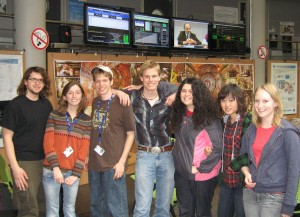Teaching Highlights
Curricular Changes
This was the first year that PY352 (Modern Physics II) was offered, in conjunction with PY351 (Modern Physics I, a slightly modified PY354). At present, PY 352 is not required, yet eight students enrolled. It covers more applied aspects of modern physics, such as electronic devices, lasers, and elementary particle detection. The small size allowed close interaction with actual faculty members in the associated laboratory, as faculty and students tried out new opportunities for more open-ended experiments than the usual sophomore-level course. After one or more additional offerings as a non-required course, we expect to evaluate whether it should be required, what modifications to the other requirements this would entail, and what implications the existence of an open-ended type of sophomore lab would have for the present Junior Lab, currently attached to PY408, Classical Mechanics.
In the spring, seven juniors from the BU Physics Department experienced a semester abroad in Geneva. These students were the first cohort in a highly successful and unique program which the department intends to run annually with logistical support from BU’s International Programs Office. Under the leadership of Professor Sulak, members of the department taught the students classes in computational physics (ROOT and C++), intensive scientific French, and arranged for students to take courses in electromagnetism (PY406) and quantum mechanics (PY451) at the University of Geneva. The cornerstone of this program was the involvement of our students in research at the CERN laboratory. The research was supervised by BU faculty, postdocs and graduate students who are on location at the LHC experiments at CERN. The current students in the program have mentioned a number of problems (mostly related to visas, language barriers and bureaucracy). However they are unanimous in their praise for the program and describe it as a transformative experience of their undergraduate careers at BU.
New Developments in Pedagogy
For five years now, Dr. Ahlam Al-Rawi has taught PY211S/212S (the summer offering of calculus-based General Physics for scientists and engineers). She comes to Boston each summer from Kansas State University, where she has on occasion assisted with their equivalent course. Professor Christopher Sorensen and others at KSU have developed an NSF-supported curriculum in which discussions, demonstrations and labs are merged into “studio” sessions that offer more opportunities for hands-on learning. With their permission, Dr. Al-Rawi has arranged to use their written materials at Boston University this summer. Throughout the year she worked with our Teaching Lab Coordinator Erich Burton and Lecture Demonstration Enhancement Coordinator Val Voroshilov to guide them in developing relatively inexpensive new equipment needed for some of those hands-on activities. This summer this studio-type approach is being used and evaluated. Special thanks is due to Erich Burton for the extra development and setup work, and to Donna Shea for facilitating the schedule changes necessary, and for providing one or two more teaching fellows than she would have ordinarily expected us to request.
In response to this initiative, Voroshilov, who is again teaching PY105S/106S (the summer offering of algebra-based Elementary Physics, for health professions and biology majors) has instituted the use of special worksheets in discussion sections and modified scheduling that links discussions with labs. This will also be evaluated.
In response to the Provost’s RULE grant competition, the physics department submitted a successful pre-proposal, to be followed next fall by a full proposal pending sufficient faculty commitment to sustain successful innovations over the long run). In its pre-proposal form, we are seeking to develop a studio curriculum for PY105/106 that incorporates a stronger emphasis on material of biological relevance. For PY211/212 we propose to “enforce” a more coordinated format that requires advance reading and a pretest of students before each lecture, followed by selection of the most relevant personal response system questions, as a key ingredient of the lecture presentations. Committees that contain more than the original proposers are working already this summer to refine the ideas for presentation in the full proposal.
Continue reading: Student Organization
 Physics | Annual Report 2010
Physics | Annual Report 2010 